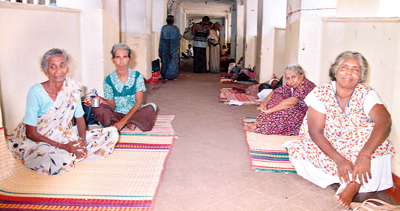Managing Cancer patients: Don’t leave it all to the NCI
The number of cancer patients has jumped to 20,000 last year and being the premier cancer hospital, the Maharagama Cancer Hospital (National Cancer Institute) bears the brunt of this increasing number. The overcrowding naturally has its impact primarily in the management of patients which leads to delays in treatment. Delaying treatment can be fatal to cancer patients.

The Maharagama Cancer Hospital (NCI) is bursting at its seams. (File pic)
The fact that the Maharagama Cancer Hospital (NCI) is bursting at its seams has inspired the medical fraternity in the provinces to act and set up peripheral cancer units to ease the load borne by the NCI. As a medical specialist pointed out most of the Government Hospitals in the Provinces could treat cancer patients as a surgeon and sometimes even an oncologist are serving in these hospitals. They are moreover equipped with ultrasound and CT scans, some even with MRI facilities. Therefore, many of the state hospitals have the facilities for diagnosis of cancer and only if there is a lack of chemo and radiotherapy in such hospitals should a cancer patient be directed to the NCI.
However, some doctors serving in hospitals in the provinces too are unaware of the facilities available in Government hospitals and therefore, once a patient is diagnosed with cancer, they directly refer them to the NCI. It is this unorganised referral-system, says the medical specialist, that causes overcrowding at the NCI – a shortcoming which could be overcome if the Health Ministry gives guidelines to doctors in the state hospitals on the availability of facilities in all state hospitals and a method of directing patients. The Ministry at the same time, must also work out a system to identify the needs of hospitals preferably in priority order which would assist when attending to them.
However, thanks to the efforts of dedicated medical specialists cancer units are being developed in hospitals in the provinces. Sixteen years ago, at the Kandy General Hospital (KGH) a Cancer Unit was established with donations received, mainly due to the efforts of the first Onco-Surgeon posted to the KGH. Setting up of cancer units was then a new sub specialised field recognised by the Health Ministry with training given by the Post Graduate Institute of Medicine. The aim of the programme was to reduce the load of patients at the NCI.
The Onco-surgeons who took over from him are following the precedent and the upgrading of this unit continues.
A gynae-oncologist is now a part of the staff of the Cancer Unit at the KHG with gynae-oncology being recognised as the newest sub speciality by the Health Ministry. But being the latest component in the KGH Cancer Unit many facilities are needed for the performance of surgery of cancers relating to gynaecology such as the ovarian, endometrial, cervical and recurrent diseases related to gynaecology which occur when cancer reappears.
Facilities that the new Gynae-oncology Ward 27 needs are many. While the Government provides the Cancer Unit with drugs, medicines and equipment, donations had helped to build the Endoscopy Room which helps to detect the spread of cancer.
Recently, the Kandy High School decided to donate the proceeds of its fund-raiser “High Beat 2012” to the Gynae-oncology Ward 27 of KGH to help the unit purchase essential surgical equipment needed and update facilities to treat gynaecological cancers. Lab facilities are also being upgraded.
The Ministry has appointed Oncologists to manage cancer patients in order that cancer patients have a better chance of survival, suffer less complications and enjoy a longer life. Earlier it was a General Surgeon who managed cancer patients.
A serious shortcoming however, is the lack of space in the Operating Theatre which means the Gynae-Oncologist at the KHG, has to share the Operating Theatre with other surgeons. Receiving less operating-time however has led to the specialist shuttling to Base Hospitals in Mawanella, Badulla, Gampola, Ratnapura and mostly to Avissawella where patients come for free surgery.
At the Galle Hospital, once again on efforts taken by dedicated Oncologists and Onco-surgeons, an up-to-date Cancer Unit with the same facilities available at the NCI has been set up. Similar efforts are taking place at the Jaffna Teaching Hospital. Hopefully, these will bear fruit as 775 cancer patients have been reported in Jaffna in the last nine months alone.
Most provincial hospitals are complete with essential surgical equipment and chemo therapy is practised at Kandy, Galle, Jaffna, Kurunegala, Badulla, Anuradhapura, Ratnapura and Batticaloa hospitals. Radio therapy is available at the Kandy, Galle, Jaffna and Anuradhapura Hospitals. Therefore, it is pointed out by the medical specialist that the need does not arise for doctors in hospitals around these areas to refer their patients to the NCI even for post-cancer treatment.
Concerned citizens of Kandy meanwhile are now developing a new Cancer Unit within the KGH where even bone marrow transplants are to be carried out. It is to be a community project based entirely on donations and built at a cost of Rs. 550 million. This is envisaged to take a few years to come up and once built the present Cancer Unit will be shifted to this fully-equipped venue.
Where patients are concerned, inevitably the lack of facilities in Government Hospitals impacts on them. If there is a breakdown in the carrying out of tests and investigations, for instance, patients are forced to do the tests outside at great cost. Sometimes the unavailability of drugs compels doctors to request patients to buy them in the market. A fund to assist cancer patients of lower income groups on the recommendation of doctors would be a way out.
Follow @timesonlinelk
comments powered by Disqus




















